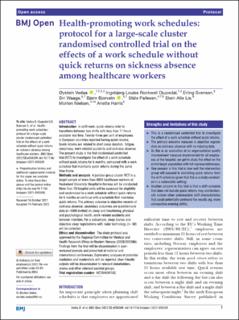| dc.contributor.author | Vedaa, Øystein | |
| dc.contributor.author | Djupedal, Ingebjørg Louise Rockwell | |
| dc.contributor.author | Svensen, Erling | |
| dc.contributor.author | Waage, Siri | |
| dc.contributor.author | Bjorvatn, Bjørn | |
| dc.contributor.author | Pallesen, Ståle | |
| dc.contributor.author | Lie, Stein Atle | |
| dc.contributor.author | Nielsen, Morten Birkeland | |
| dc.contributor.author | Harris, Anette Kristoffersen | |
| dc.date.accessioned | 2022-06-27T08:18:11Z | |
| dc.date.available | 2022-06-27T08:18:11Z | |
| dc.date.created | 2022-04-19T14:22:43Z | |
| dc.date.issued | 2022 | |
| dc.identifier.issn | 2044-6055 | |
| dc.identifier.uri | https://hdl.handle.net/11250/3001002 | |
| dc.description.abstract | Introduction
In shift work, quick returns refer to transitions between two shifts with less than 11 hours available rest time. Twenty-three per cent of employees in European countries reported having quick returns. Quick returns are related to short sleep duration, fatigue, sleepiness, work-related accidents and sickness absence. The present study is the first randomised controlled trial (RCT) to investigate the effect of a work schedule without quick returns for 6 months, compared with a work schedule that maintains quick returns during the same time frame.
Methods and analysis
A parallel-group cluster RCT in a target sample of more than 4000 healthcare workers at Haukeland University Hospital in Norway will be conducted. More than 70 hospital units will be assessed for eligibility and randomised to a work schedule without quick returns for 6 months or continue with a schedule that maintains quick returns. The primary outcome is objective records of sickness absence; secondary outcomes are questionnaire data (n≈4000 invited) on sleep and functioning, physical and psychological health, work-related accidents and turnover intention. For a subsample, sleep diaries and objective sleep registrations with radar technology (n≈ 50) will be collected.
Ethics and dissemination
The study protocol was approved by the Regional Committee for Medical and Health Research Ethics in Western Norway (2020/200386). Findings from the trial will be disseminated in peer-reviewed journals and presented at national and international conferences. Exploratory analyses of potential mediators and moderators will be reported. User-friendly outputs will be disseminated to relevant stakeholders, unions and other relevant societal groups. | en_US |
| dc.language.iso | eng | en_US |
| dc.publisher | BMJ Publishing Group | en_US |
| dc.rights | Navngivelse 4.0 Internasjonal | * |
| dc.rights.uri | http://creativecommons.org/licenses/by/4.0/deed.no | * |
| dc.title | Health-promoting work schedules: protocol for a large-scale cluster randomised controlled trial on the effects of a work schedule without quick returns on sickness absence among healthcare workers | en_US |
| dc.type | Journal article | en_US |
| dc.type | Peer reviewed | en_US |
| dc.description.version | publishedVersion | en_US |
| dc.rights.holder | Copyright Author(s) (or their employer(s)) 2022 | en_US |
| dc.source.articlenumber | e058309 | en_US |
| cristin.ispublished | true | |
| cristin.fulltext | original | |
| cristin.qualitycode | 1 | |
| dc.identifier.doi | 10.1136/bmjopen-2021-058309 | |
| dc.identifier.cristin | 2017608 | |
| dc.source.journal | BMJ Open | en_US |
| dc.relation.project | Norges forskningsråd: 303671 | en_US |
| dc.identifier.citation | BMJ Open. 2022, 12 (4), e058309. | en_US |
| dc.source.volume | 12 | en_US |
| dc.source.issue | 4 | en_US |

